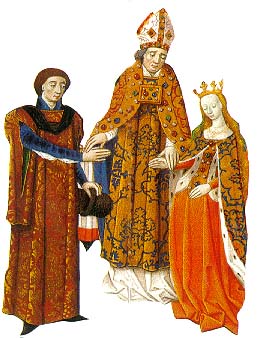Introduction
Baldwin II of Bourcq, Count of Edessa and King of Jerusalem. A man William of Tyre described as, "a devout and God-fearing man, notable for his loyalty and for his great experience in military matters." He left his family to go with his cousins to go on the First Crusade. A relative of Godfrey of Bouillon, Eustace III of Boulogne, and Baldwin of Boulogne; the exact way they were related is unclear to historians. Maybe it was the awesomeness.
After the First Crusade, Baldwin entered into the service of Bohemond of Taranto. He was Regent of the Principality of Antioch whilst his liege, now Bohemond I of Antioch, was held hostage by the Danishmend Turks. After his cousin Baldwin of Boulogne was elected King of Jerusalem with the death of the great Godfrey of Bouillon, the king gave Baldwin of Bourcq his old position as Count of Edessa from Godfrey, and the Norman Tancred was made Regent of the Principality of Antioch in his stead. Feudal Hand-Me-Downs were common in Christendom. Baldwin worked to see Bohemond rescued from captivity, not much liking how Tancred governed Antioch.
Dealings in Edessa
While Count, he married an Armenian woman named Morphia of Melitene, daughter of of the wealthy ruler of Melitne, Gabriel of Melitene. In principal, the marriage was to solidify good political relations between the two, but Baldwin showed himself extremely devoted and loving as a husband. They had four daughters together. When Baldwin was to be crowned, he delayed his coronation service to give time for his wife to come with their children to witness it and to have her crowned as queen by his side.
Battle of Harran
+Miniature;+Deployment.JPG) |
| The Battle of Harran in Miniature; the Deployment Phase |
Baldwin was a commander on the left wing of the Frankish army at the ill-fated Battle of Harran on the 7th of May, AD 1104. A feigned retreat that the Crusaders took turned the battle for the worse, and the Crusaders were caught by surprise and routed. Bohemond was captured; his ransom was paid, though he did not get released until AD 1108.
Game of Thrones, Much?
Baldwin's absence left a power vacuum that was filled by Joscelin of Courtenay (also captured at the Battle of Harran, but was released several months before Baldwin). Joscelin strengthened his own lands west of Baldwin's own land and left Baldwin's lands to be raided by the Turks. Tancred was named regent of the county during Baldwin's extended captivity, but he didn't seem care to watch after the province. Perhaps revenge for having cut his tenure as Regent of Antioch short?
Baldwin eventually returned at last and was not amused at the state in which he found his lands. Joscelin had to sting most of all, considering the two were not only fellow crusaders - he and Tancred were all at the Sack of Jerusalem - but relatives. When Baldwin returned, Tancred wisely chose to step down though bad blood persisted and would remain until the two reconciled at the Siege of Tripoli.
Baldwin I died in AD 1118. The crown was offered to the king's eldest brother, Eustace III, but Joscelin of Courtenay swayed public opinion in favor of Baldwin. Perhaps making amends for the harm he'd done in letting Baldwin's lands suffer?
 |
| Baldwin as King of Jerusalem |
What one Plants...
Hearing the news of the coronation of a new King of Jerusalem, the Fatimid Caliphate and the Seljuk Turks launched joint invasions of Judea thinking that the territory would be vulnerable. Baldwin quickly mobilized the kingdom's defenses in response, and the Fatimids and Seljuks thought better of it due to the speed in which the defenders prepared. Baldwin II was already proving promising; without a single battle he averted what could've been a disaster for the Kingdom.
Baldwin II also reversed the territorial gains after the disastrous Battle of Ager Sanguinis ("Field of Blood" in English), in which then Prince of Antioch Roger of Salerno and most all of his host was massacred by a Turkish invasion force. Baldwin rode north with his own army and helped the Principality to drive out the Seljuk hordes back to the Anatolia.
 |
| The Battle of Ager Sanguinis, from a AD 1337 artist's rendering. |
Given how violent this period of Crusader history was, it will come as no surprise to learn that this was the era in which the Militant Monastic Orders began to take shape, such as the Knights Templar. It was King Baldwin II who allowed the Templars to make their headquarters on the Temple Mount in what was the Al Aqsa Mosque (I like to think Baldwin and Hugues found the irony in this to be delicious, and as such made the decision purposefully; most of the mosques on the Temple Mount had been converted to monasteries) which at the time was a part of the Royal Palace.
In AD 1120, Baldwin showed himself an astute administrator and called the Council of Nablus; something of a cross between a parliament and a church council, it was a meeting of ecclesiastical and secular lords of the Kingdom in conjunction with the Patriarch Warmund (yes, that was his actual name) of Jerusalem. The laws are actually quite fascinating. Read them for yourself
here; I rather like them. The logic behind calling the council was two-fold: to find a solution for the mice and locusts plaguing the kingdom, and to bring the kingdom in right standing in the eyes of heaven by enacting laws to encourage moral fiber among the people to obtain the blessing of Almighty God in their war against the Muslims.
Second Time's the Charm!
Joscelin has since been made Count of Edessa in AD 1122, what with Tancred being dead by this point and Baldwin being far too busy being king to manage it. Joscelin was captured in a skirmish and Baldwin rode north with his host to save him, but he too was captured during an ambush. Joscelin eventually escaped with the help of some Armenians, but Baldwin was not released until his wife, Queen Morphia, rode north with an army of Armenian mercenaries to find her husband and rescue him. Ultimately she located him and negotiated his safe return. Part of the demanded ransom was Baldwin's youngest daughter, Ioveta. He bought her back with the spoils of war from a Turkish army he defeated at the Battle of Azaz later that year. after a short time in hostage. Surprisingly, nothing indicates she was harmed or assaulted during her captivity. Some nobility in them after all, the Saracens.
 |
| I think it's save to say Baldwin was one more imprisonment short of appearing in a Bethesda game. |
Meanwhile, the Crusaders had completed the Siege of Tyre with a victory thanks to a Venetian Fleet. This was before Venetians got into the habit of attacking the wrong city on purpose for money and getting excommunicated for it. This successful bit of cooperation, and the ensuing quarrel over who should get the city - damn Venetians can't just let one thing go smoothly without trying to make a profit, can they? - lead to the,
Pactum Warmundi or, "Peace of Warmund" which agreed to place the towns under the control of the Kingdom of Jerusalem but allow independent Venetian trading colonies within the cities.
On top of the Battle of Azaz - which, by the way, was a victory against all odds for the Crusaders - everything seemed to be going well. With the help of the Templars, Baldwin decided to take a shot at Damascus with the Templars, but was repulsed by Emir Toghtekin of Damascus and his Muslim army. Not really that bad; Damascus was always a tough nut to crack for the Crusaders.
Succession Policy and Death
Baldwin and Morphia never managed to have a son;
instead of being a deadbeat twat and throwing a hissy fit, blaming the woman, divorcing her illegally, then rinsing and repeating with eight other women in what amounted to adultery and starting a devastating schism over the course of it all along with a succession crisis that would come back to hurt Christendom for the next several hundred years, he arranged for his eldest daughter Melisende to be wed to Fulk V of Anjou (who would become Fulk the First-and-Only of Jerusalem) who was so powerful in military might and so wealthy he rivaled the Roi de France of his day. The kingdom, in the long-term, profited from his and Melisende's reign.
Baldwin II died after falling ill in Bethany in 1131; he died that same year on August 21 and was buried in the Church of the Holy Sepulchre. As far as I am able to discern, his tomb was moved elsewhere during some renovation to keep the building standing.
 |
| Fulk (left) and Melisende's (right) wedding. |
... One Sows.
Peculiarly to me, Baldwin II wasn't liked by some of his contemporaries. Galbert of Bruges cleric and chronicler in Flanders, accused him of being quote, "grasping and penurious." The cleric also said Baldwin was captured multiple times because he, quote, "had not governed the people of God well." He even claims that at one point during one of Baldwin's imprisonments the Crown of Jerusalem was offered to Charles I "The Good" Count of Flanders. How he can draw these conclusions after most of the good seemingly done in Baldwin's reign, I can't fathom. Even a Muslim Chronicler of the time, ibn al-Qalansi was more favorable when he wrote, quote, "after him there was none left amongst them possessed of sound judgment and capacity to govern."
Not often talked about, but I look favorably upon the man. He was a good king that did great things in the span of his time. Not a legend, but a good king, a good man, and a good Catholic nonetheless. His victories in battle, his piety, and his legal reforms all benefited the kingdom immensely. His commitment to his wife and children even in the midst of the hustles and bustles of royal business and his willingness to forgive his political enemies - and the fact they took this to heart and did not transgress him again - all make him a worthy example to be followed.
 |
| It also, I think, definitely shows he deserves his place in Versailles. Rest well, good king; I hope to see you with the Saints. |








+The+Baptism+of+Clovis.jpg)












+Miniature;+Deployment.JPG)






